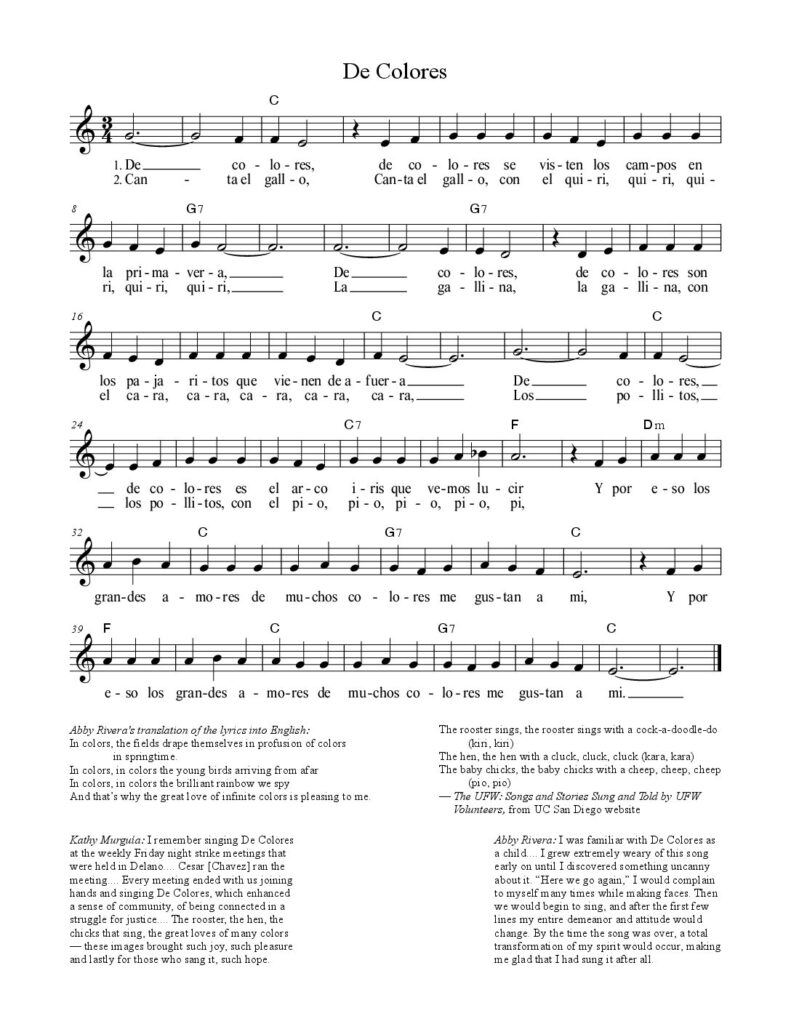Back in 1993, when they revised the Unitarian Universalist hymnal, the editors decided to include “De Colores.” I’ve always hated “De Colores.” It’s a kids’ song. Actually, I like a lot of kids’ songs, but to me “De Colores” sounded like something from that horrible kid show with the ridiculous purple dinosaur.
It didn’t help that I knew why they put “De Colores” in the hymnal. It was famous for being sung by Cesar Chavez and the United Farm Workers (UFW). It’s great that they put in a union song, but if they’re going to put in a union song, then why not “Solidarity Forever”? Why not “Commonwealth of Toil”? Because, said my cynical self, “De Colores” could be passed off as just a kids’ song, or a song about racial harmony, instead of a song about stopping exploitation of workers. And the English-language verses in the hymnal aren’t even the ones sung by Cesar Chavez and the UFW.
Well, I’ve finally decided that I actually like “De Colores.” In part this was because I finally found a performance of it I liked: the very simple, straightforward version by José-Luis Orozco on Youtube. Then I found “The UFW: Songs and Stories Sung and Told by UFW Volunteers,” which has this story by Abby Rivera:
“I was familiar with ‘De Colores’ as a child…. I grew extremely weary of this song early on, until I discovered something uncanny about it. ‘Here we go again,’ I would complain to myself many times while making faces. Then we would begin to sing, and after the first few lines my entire demeanor and attitude would change. By the time the song was over, a total transformation of my spirit would occur, making me glad that I had sung it after all. It came to be my spiritual cleansing song, because the words reached deep into my soul and took me to another place where things are perfect, in harmony, of like mind and purpose….”
OK then. If Abby Rivera can find spiritual cleansing in this song, I guess I can too. But only if we sing the verse about the chickens.

P.S.: And if you want to turn it into an actual union song, here are two verses (in English) that I learned from Pat Wynne and the San Francisco Rocking Solidarity Labor Chorus:
“Cesar Chavez, Cesar Chavez devoted his life to the Farm Worker’s Union,
Cesar Chavez, Cesar Chavez dreamed of a good life for all campesinos,
Cesar Chavez, may your courage and vision live on in our hearts and our hands,
May your spirit endure and inspire us all to continue the work you began. (2x)
“Si se puede, si se puede means: yes, we can do it, if we all believe it,
Si se puede, Cesar said, “Si se puede,” and showed us the way to achieve it,
Cesar Chavez, may your courage and vision live on in our hearts and our hands,
May your spirit endure and inspire us all to continue the work you began. (2x)
